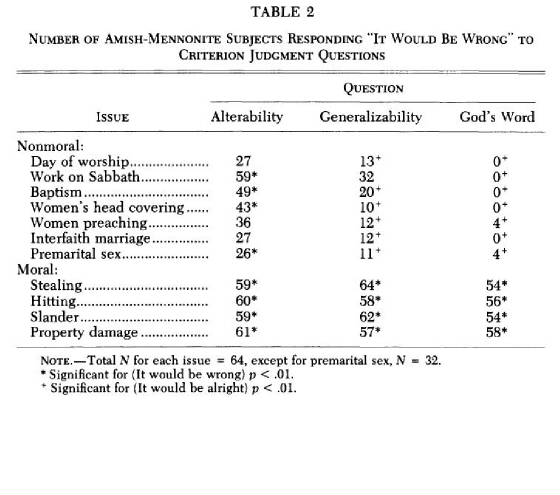|
- Nucci divided religious rules and doctrines into two
groups: Moral Rules (actions considered sins such as murder, stealing) and Non-moral Rules (social behaviors and/or worship
patterns)
- Tested children between the ages of 10 to 17.
Age groups were divided into 10-11, 12-13, 14-15, and 16-17.
- Four religion sects were tested (Roman Catholics, Amish/Mennonites,
Conservative Jewish, Orthodox Jewish)
- Each group were asked questions in an interview (Catholics
were given a survey) if "It would be wrong" if the rule was removed in their religion, if it would be wrong for another religion
to commit the act, and if Jesus/ God/ the Pope did not say it was wrong.
- According to Nucci, religion is not a factor for moral development.

|
| Table from "God's Word..." written by Larry Nucci and Eliot Turiel |
Sample interview with SAM (Consevative Mennonite boy, age 11 years, 11 month)
Moral Issue: Stealing
Interviewer: Is it okay to steal?
SAM: No.
I: Why not?
S: Because it is one of the Ten Commandments that God put in the law and gave to Moses and He expects us to
obey these laws...
I: What's wrong with stealing?
S: Having something that does not belong to us and taking it from someone else, it would irritate you...
Nucci, Education in the Moral Domain, 35
Controversy with the results.
Larry Nucci's
results have been criticized by Dr. Robert Kunzman of Indiana University.
He stated in his article, " Ethic and the Implications for Moral Education: a critique of Nucci's Morality and Religious Rules" used the results from Nucci's and Turiel's experiment to explain that the
answers that the children interviewed developed their moral understanding from religion.
|

